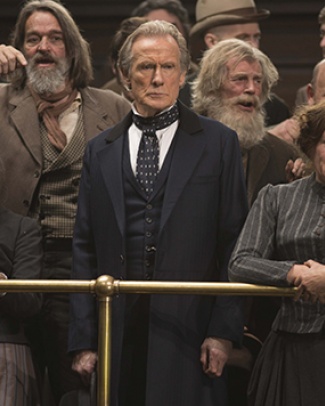As the end credits on The Limehouse Golem started to roll, I found myself in that most peculiar – and uncomfortable – place for a reviewer of films: and that was quite at a loss for things to say. Since I have now regained my composure sufficiently to be writing this, it clearly did not last. Still, it is rare enough occurrence for me to be surprised by my own surprise.
First, though, the film. Superficially, it is a pretty ordinary Victorian slasher pic/gorefest, very consciously evoking, with its images of gritty Eastenders “cor blimeying” it through poverty and degradation, Theatrical players and (very) bloody murders every Jack the Ripper pic ever. Though there's a twist.
A more conventional film might have focused on the investigation by Inspector Kildare (Bill Nighy) of the truly grisly killings at the heart of this film. But his investigation runs in parallel with the story of Lizzie Cree (Olivia Cooke), on trial for the murder of her husband (Sam Reid) who might, himself, be the “Golem killer”, and – Kildare clearly has a soft spot for poor put upon Lizzie – if it turns out that hubby really was a serial killer, she may yet escape the hangman's noose. So this is as much about Lizzie as Kildare, with a strong, show-stealing performance throughout by Cooke.
Meanwhile,Theatre impresario and arch cynic, Dan Leno (Douglas Booth), provides commentary to the murders, in a style reminiscent of Joel Grey's MC in Cabaret. One more twist – this is, after all, based on a book by Peter Ackroyd with screenplay by the very intelligent Jane Goodman! - the three other chief suspects are an unlikely trio of real historical characters, including Karl Marx, actor Dan Leno and author George Gissing.
As coherence returned, two thoughts were uppermost. The first, that were I Bill Nighy, I would be having words with my agent. Pretty much the first observation of every review to date is that this role, of the slightly dour, proper Scotland Yard detective, passed over for promotion because he is “not the marrying type” is not what we have come to expect from Bill Nighy.
Altogether vanished is Nighy as bumbling, amiable shy avuncular figure with a fine line in inadvertent romance. Some reviewers like it. Others – myself included – were less impressed. For this is not brilliant detection à-la-Sherlock. Nor, pace pretty much every other movie detective, from Colombo to Kojak, is it done with wit. Rather it seems detection by doing nothing, stumbling through the motions, providing few insights and, as we realise by the end, getting it very wrong along the way.
I don't think this adds much to his film credits and I wonder what this film would have been had Alan Rickman, originally cast for the role of Kildare, not been forced to withdraw, due to illness.
Second, I was filled with a certain bemusement because, despite the police focus and Ripperesque trappings, this did not feel much like a detective film, so much as yet another in the genre of films designed to queer traditional boundaries and “make you think”. Here, every boundary is fuzzy: past and present, real life and theatre; boy and girl. In this one the gender-fluidity is strong, with Leno spending half the film as girl and Lizzie making a very fine boi indeed, both on and off-stage.
Nothing is as it seems!
At the same time, the film's incredibly negative take on almost all the male protagonists have led some, including the Telegraph, to claim it as a “feminist film”. Oh dear. They would say that, wouldn't they?
In the sense that it guts and exposes misogyny and male privilege in all its forms, including the hypocritical white-knightery with which John Cree no doubt excuses his own appalling behaviour, it will have feminist fans. In this though, it is reminiscent of another gory puzzle film, Gone Girl, which exposes similar male badness, before going on tacitly to endorse the even worse behaviour of the woman whose disappearance sets the film's events in motion.
Perhaps, with that insight, I am finally catching up on why I found myself initially at a loss. Because, like so many films with Theatre at their heart, The Limehouse Golem is sleight of hand, and very much NOT about what you think it is.
It is murder mystery in name only. Its real focus is on how individuals under pressure, in the most terrible of circumstances, survive. Everyone in this film has a darkness inside: all, including the crowd who merely stand and watch, are guilty at some level. And that – not the gore and not the bloody murders – is perhaps the most unsettling aspect of all.
Three and a half stars.


